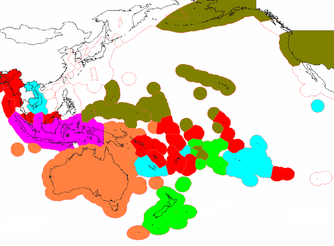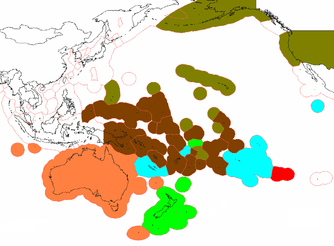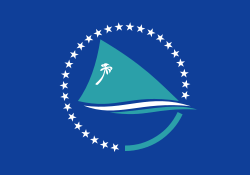Pacific Community
The Pacific Community (SPC) is the principal scientific and technical organisation in the Pacific region. It is an international development organisation owned and governed by its 26 country and territory members. With more than 600 staff, the organisation's headquarters are in Nouméa, New Caledonia, and it has regional offices in Suva, Fiji, and Pohnpei, Federated States of Micronesia, as well as a country office in Honiara, Solomon Islands, and field staff in other Pacific locations. Its working languages are English and French.
History

The Pacific Community was founded in 1947 as the South Pacific Commission by six developed countries with an interest in the region:
For reasons either of reduced development interest in the Pacific Islands region or a desire to concentrate assistance in other areas of greater poverty, two founding members have since withdrawn from SPC: the Netherlands in 1962 and the United Kingdom in 1994 and – after rejoining in 1998 – again in 2004.
SPC's founding charter is the Canberra Agreement.[1][2] In the aftermath of World War II, the six colonial powers which created the SPC arguably intended it to secure Western political and military interests in the postwar Pacific.[3][4][5]
From the start, SPC's role was constrained, and the invitation from Australia and New Zealand to the US, France, Netherlands and the UK to participate in a South Seas Commission Conference in 1947 included the statement that "the [South Pacific] Commission to be set up should not be empowered to deal in any way with political matters or questions of defense or security"[6] This constraint on discussion (particularly the constraint on discussing nuclear weapons testing in the region) led, eventually, to the creation of the South Pacific Forum (now Pacific Islands Forum), which not only excluded the more distant "metropolitan" powers of France, UK and USA, but also their Pacific Island territories.
Present

Today, SPC is the principal scientific and technical organisation in the Pacific region.[7]
SPC works closely with donor and technical assistance organisations such as AusAID, the European Union, FAO, the United Nations, New Zealand Aid Programme and CTA.
The SPC family includes all 22 Pacific island countries and territories, which since 1983 have been full members:
These were all territories (or, in the case of Tonga, a protected state) of the original founder members of SPC, but most are now independent. Dutch New Guinea, formerly represented in the SPC by the Netherlands, was transferred to the United Nations in 1962 and to Indonesia in 1969. Thus, the Netherlands is no longer represented in the SPC since the end of 1962. The United Kingdom also withdrew from the organisation on 1 January 1995.
SPC today is the oldest and largest organization in the Council of Regional Organisations in the Pacific (CROP), a consultative process that is headed at the political level by the Pacific Islands Forum Secretariat. Since the hand-over of co-ordination of regional political issues from the SPC Conference to the South Pacific Forum in the 1970s, SPC has concentrated on providing technical, advisory, statistical and information support to its member governments and administrations, particularly in areas where small island states lack the wherewithal to maintain purely national cadres of expertise, or in areas where regional co-operation or interaction is necessary.
SPC was the first CROP organization to be headed by a woman, Lourdes Pangelinan of Guam who left the organization end of January 2006. Colin Tukuitonga is the organization's current Director-General.
SPC programmes and services
SPC works across more than 25 sectors. It is involved in such areas as fisheries science, public health surveillance, geoscience and conservation of plant genetic resources for food and agriculture. Much of SPC’s focus is on major cross-cutting issues, such as climate change, disaster risk management, food security, gender equality, human rights, non-communicable diseases and youth employment. Using a multi-sector approach in responding to its members’ development priorities, SPC draws on skills and capabilities from around the region and internationally, and supports the empowerment of Pacific communities and sharing of expertise and skills between countries and territories.
It has seven divisions: Economic Development, Fisheries, Aquaculture and Marine Ecosystems, Geoscience, Land Resources, Public Health, Social Development and Statistics for Development. SPC also has an Operations and Management Directorate, various programmes and other main work areas.
Land Resources Division
The Land Resources Division, based in Suva, comprises two programmes – sustainable management of forest and agriculture systems, and biosecurity and trade facilitation. It operates the Centre for Pacific Crops and Trees, which is a plant propagation vault in Fiji. The Secretariat of the Pacific Community's Land Resources Division provides advice, expertise, technical support and training to members on all aspects of agriculture and forestry, including:
- plant health
- animal health
- biosecurity and trade
- forest and agriculture diversification
- crop production
- animal production
- genetic resources
- information, communication and extension
- forest and trees
Fisheries, Aquaculture and Marine Ecosystems Division
This division has seven sections organised into two programmes which provide services to member countries and territories.[8] In the case of the Oceanic Fisheries Programme these scientific and statistical services complement the highly-migratory fish stock management and MCS services provided by other western Pacific regional fisheries bodies, including the Forum Fisheries Agency, the Western and Central Pacific Fisheries Commission, the Parties to the Nauru Agreement and Te Vaka Moana.[9] The Coastal Fisheries Programme however is the only Pacific Islands regional fisheries body providing monitoring, science, management and development services in reef or nearshore fisheries and aquaculture.
Oceanic
- Oceanic Fisheries Monitoring
- Fisheries Data Management
- Stock Assessment and Modelling
- Ecosystem Monitoring and Assessment
Coastal
- Aquaculture
- Coastal Fisheries Science and Management
- Nearshore Fisheries Development
Social Development Division
This division covers a broad range of areas and includes the:
- Cultural Affairs Programme – support activities in the fields of conservation of cultural heritage, communication technologies, development of cultural industries and promotion of artistic creativity. A major thrust of this programme is the organisation of the Festival of Pacific Arts.[10]
- Human Development Programme – provides community education, and supports policy making and analysis relating to culture, gender equality and youth
- Public Health Programme – technical support and advice on non-communicable diseases (such as diabetes and heart disease); communicable diseases (HIV/AIDS and STIs, tuberculosis); adolescent reproductive health; nutrition; physical activity; alcohol and tobacco control; public health surveillance
Operations and Management Directorate (OMD)
- Administration (general administration, registry, property, maintenance, procurement, travel and conference services)
- Finance
- Human Resources
- Information and Communication Technology
- Legal
- Library
- Publications and Printery
- Translation and Interpretation
- North Pacific Regional Office (NPRO), based in Pohnpei, Federated States of Micronesia
- Solomon Islands Country Office (SPCSI), based in Honiara, Solomon Islands
Strategic Engagement, Policy and Planning Facility
- Country and programme support
- Regional cooperation and strategic positioning initiatives
- Policy analysis, research and mainstreaming of cross-cutting issues
- Monitoring and evaluation
SPC executives
SPC chief executives
The following is a list of the Secretaries-General and Directors-General (the title of the chief executive was changed in 1997) of the Pacific Community (the name of the Organization was also changed in 1997, from South Pacific Commission to Secretariat of the Pacific Community, and changed again to Pacific Community in 2015):
- William D. Forsyth (Australia) 1 November 1948 – 3 June 1951
- Sir Brian Freeston (UK) 12 November 1951 – 12 November 1954
- Ralph Clairon Bedell (USA) 1 March 1955 – 28 February 1958
- Thomas Richard Smith (NZ) 1 March 1958 – 2 March 1963
- William D. Forsyth (Australia) 24 March 1963 – 31 December 1966
- Gawain Westray Bell (UK) 1 January 1967 – 11 December 1969
- Afioga Afoafouvale Misimoa (Western Samoa) 1 January 1970 – 18 February 1971 (he died on official mission in Tarawa, Kiribati)
- John E. de Young (USA) 18 February 1971 – 31 October 1971 (he was Programme Director: Social who acted in the interim period for the above)
- Gustav F. D. Betham (Western Samoa) 1 November 1971 – 30 November 1975
- E. Maciu Salato (Fiji) 9 December 1975 – 30 June 1979
- Mititaiagimene Young Vivian (Niue) 1 July 1979 – 3 June 1982
- Francis Bugotu (Solomon Islands) 1 July 1982 – 30 November 1986
- Palauni M. Tuiasosopo (American Samoa) 9 December 1986 – 31 December 1988 (stood down)
- Jon Tikivanotau Jonassen (Cook Islands) 1 January 1989 – 15 June 1989 (he was Director of Programmes acting in the interim)
- Atanraoi Baiteke (Kiribati) 16 June 1989 – 5 January 1993
- M. Jacques Iékawé (New Caledonia) (SG designate but died on 10 March 1992 before assuming office)
- Ati George Sokomanu (Vanuatu) 6 January 1993 – 7 January 1996
- Robert B. Dun (Australia) 8 January 1996 – 5 January 2000 (he restructured the organisation and changed the title of the chief executive from "Secretary-General" to "Director-General")
- Lourdes T. Pangelinan (Guam) 6 January 2000 – 5 January 2006
- Jimmie Rodgers (Solomon Islands) 6 January 2006 – 5 January 2014
- Colin Tukuitonga (Niue) 5 January 2014 – present
Directors of services / Deputy Directors-General / Deputy Directors-General in charge of Operations and Management (from 2013 onwards)
- Helene Courte (New Caledonia) 1989–92
- Fusi Caginavanua (Fiji) 1992–95
- Lourdes T. Pangelinan (Guam) 1995–99
- Yves Corbel (France) 2000–06
- Richard Mann (Germany–France) 2006–13
- Cameron Diver (New Zealand–France/New Caledonia) 2013–present
Directors of programmes / deputy directors general
- Poloma Komiti (Samoa) 1989–95
- Jimmie Rodgers (Solomon Islands) 1995–2005
- Falani Aukuso (Tokelau) 2005–08
- Fekitamoeloa ‘Utoikamanu (Tonga) 2009–15
Directors of marine resources / fisheries coordinators
- Bernard Smith (Australia) 1981–91
- Julian Dashwood (Cook Islands) 1991–97
- Tim Adams (UK) 1997–2008
- Michael Batty (UK) 2008–13
- Moses Amos (Vanuatu) 2014–present
Directors of land resources
- Aleki Sisifa (Tonga) 2003–10
- Inoke Ratukalou (Fiji) 2010–present
Directors of corporate services
- Louni Hanipale Mose (Samoa) 1994–2008
- Leslie Walker (Australia) 2008–present
The Pacific Way
SPC produces a television show, The Pacific Way. It began in 1995, supported by UNESCO, as a trial for exchanging news stories – with just one tape circulated between TV stations in several Pacific Island nations – and has evolved into a series distributed to 21 TV stations around the region. The half-hour weekly show shares development stories about the Pacific for the Pacific. It covers important topics and key issues, such as climate change adaptation, health, youth employment, innovation in agriculture, fisheries management and the protection of cultural heritage.
See also
- Festival of Pacific Arts
- Pacific Island Farmers Organisation Network (PIFON)
- Pacific Islands Forum
- Pacific Islands Private Sector Organisation (PIPSO)
- Asia-Pacific Fishery Commission (APFIC)
- Western and Central Pacific Fisheries Commission
- International organization
Footnotes
- ↑ The Governments of Australia, the French Republic, the Kingdom of the Netherlands, New Zealand the United Kingdom of Great Britain and Northern Ireland, and the United States of America (August 1984). "CONSOLIDATION OF AGREED PROVISIONS AND PRACTICES RELATING TO THE ESTABLISHMENT AND OPERATION OF THE SOUTH PACIFIC COMMISSION, INCLUDING THE CANBERRA AGREEMENT OF 1947 AS AMENDED". Australian Treaty Series 1948 No. 15 (Fourth ed.). Australian Government Publishing Service. Retrieved 2008-08-11. The fourth edition of the document hosted on the Secretariat of the Pacific Community web site.
- ↑ The Governments of Australia, France, New Zealand, the United Kingdom of Great Britain and Northern Ireland and the United States of America (August 1984). "Agreement establishing the South Pacific Commission (Canberra, 6 February 1947)". Australian Treaty Series 1948 No. 15 (First ed.). Australian Government Publishing Service. Retrieved 2008-08-11. The first edition document hosted on the Australasian Legal Information Institute web site.
- ↑ Stearns, Editor, Peter N.; et al. (June 2002). "The Pacific Region, 1944–2000: The Islands, 1946–2000: 1947". The Encyclopedia of World History: Ancient, Medieval, and Modern. www.bartleby.com. Retrieved 2008-08-13. A licensed reproduction of Peter N. Stearns; et al., eds. (2001). "H, 1, 1947". The Pacific Region, 1944–2000: The Islands, 1946–2000: 1947. The Encyclopedia of World History: Ancient, Medieval, and Modern. Boston: Houghton Mifflen Company. pp. =xxvii, 1243p.; maps; 25 cm. ISBN 0-395-65237-5.
- ↑ "Secretariat of the Pacific Community". Encyclopædia Britannica Online. Encyclopædia Britannica. 2008. Retrieved 2008-08-16. Supports SPC's formation "to advise on economic, social, health matters affecting the South Pacific Island territories..."
- ↑ South Pacific Commission (1988). "South Pacific Commission: History, aims, and activities". Pacific Islands Internet Resources. Michael R. Ogden, PhD. Retrieved 2008-08-16. "The establishment of the Commission was a response by the then colonial powers to assure the economic and social stability of the Island countries and avoid a repeat of the World War II experience by creating mechanisms for meaningful relations among governments." In other words, the SPC fosters regional socio-economic stability and it provides a channel for intergovernmental relations. Regional stability and intergovernmental relations serve not only the people who live in the Pacific, but they also ultimately serve the military and political interests of the Western countries which helped found it.
- ↑ A.H. McLintock, Editor, ed. (originally published 1966). Te Ara – The Encyclopedia of New Zealand, updated 2007-09-18. International Relations: The South Pacific Commission. ISBN 978-0-478-18451-8. Retrieved 2008-08-16. Check date values in:
|date=(help) "From the outset political and security matters were excluded from consideration; the proposed Commission was to act in a consultative capacity on questions of welfare of the peoples in the area and social and economic development." - ↑ SPC Mission and Vision. Retrieved 29 August 2016.
- ↑ Secretariat of the Pacific Community. "FAME Division". Secretariat of the Pacific Community web site (in English and French). Secretariat of the Pacific Community. Retrieved 2012-10-08.
- ↑ "Te Vaka Moana: South Pacific Fisheries Cooperation". Retrieved 8 October 2012.
- ↑ UNESCO (27 July 1998). "RELATIONS WITH THE PACIFIC COMMUNITY AND DRAFT AGREEMENT" (PDF). United Nations Educational, Scientific and Cultural Organization. Retrieved 2008-08-12. Though it refers to organizing the 2000 New Caledonia Festival of Pacific Arts and is dated, page two documents SPC involvement with Festival of Pacific Arts and other cultural initiatives.
